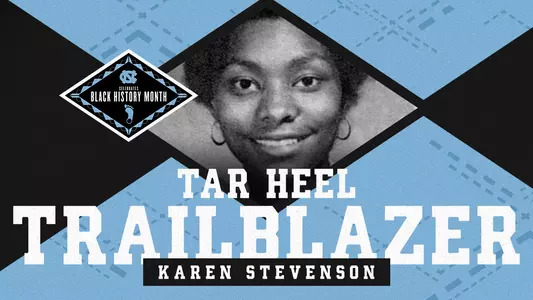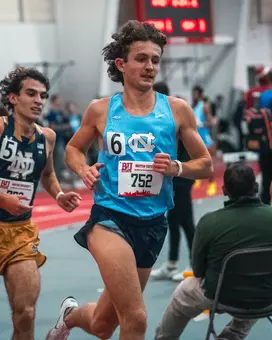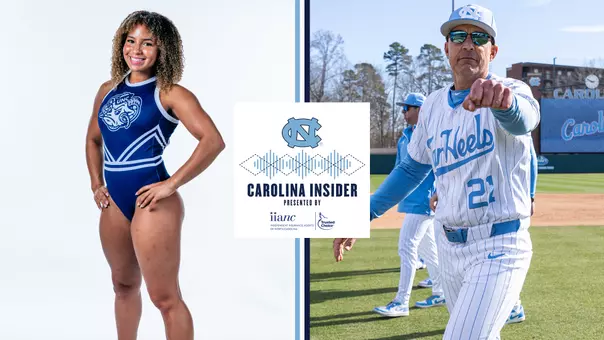University of North Carolina Athletics

Tar Heel Trailblazer: Karen Stevenson
February 10, 2015 | General, Track & Field, Turner Walston
Update, Feb. 2019:
In celebration of Black History Month, GoHeels.com will take a look back at each of the Tar Heel Trailblazers honored since 2014, with updates by Pat James.
On Aug. 10, 2015, Karen Stevenson was sworn in as a magistrate judge for the United States District Court for the Central District of California. The Central District of California is comprised of Los Angeles, Orange, Riverside, San Bernardino, Ventura, Santa Barbara and San Luis Obispo counties. It serves approximately 19.6 million people, almost half the population of the state of California.
Before then, Stevenson was nominated as one of the Top 100 Women Litigators by the Women Lawyers Association of Los Angeles and in March 2015 was named one of the nation's Most Influential Black Lawyers by Savoy Magazine.
By Turner Walston
Karen Stevenson might not have set out to blaze a trail, but she did anyway. After growing up in Washington, D.C. in the 1960s and 70s, she attended prep school in Connecticut. In 1975, she became the first African-American woman to be awarded a Morehead Scholarship.
"I came to Carolina and loved it," she said. "I just had a really, really, really great experience."
Having run track in high school, Stevenson wanted to continue with sports and saw an opportunity to join the team at Carolina. "I really loved it," she said. "I enjoyed the coaching and the opportunity to compete." And compete she did, in a lot of events: the 400 meters, the 100-meter hurdles, the 4x4 relay, 4x1 relay and 200 meters. "I ran the 100 meters occasionally, but my best events were the 400 and the 200, and the 4x4 relays," she said. Stevenson set 14 school records and twice won the Jim Tatum Award for athletic and academic leadership.
Off the track, Stevenson was involved in the service fraternity Alpha Phi Omega at Carolina, one of the first chapters to go co-ed. "I was studying, running, or doing stuff with APO, pretty much," she said.
In the classroom, Stevenson would eventually become a history major, though she didn't start out with that in mind. By the time she got to Carolina, she had satisfied many general education requirements through AP courses in high school. So in Chapel Hill, she took classes that interested her. She studied Russian and took classes on the Constitution and U.S. diplomacy, thinking perhaps she'd enter the foreign service upon graduation. She was fascinated by art history as well.
Stevenson didn't come to college with a concrete plan to graduate and work in a particular field. Rather, she let her interests guide her. "I just really encourage students, particularly in those first two years, to follow those interests, because you don't know what you don't know. You don't know what's going to grab your interest until you take a geology class or take that one extra math class, and go, 'That's not for me,' or, 'Oh my God, this is what I love,'" Stevenson said. "I was always driven more by passion and interest than trying to reach a particular goal, although I did know by my junior year that I really wanted to go to law school."
Toward the end of her junior year, she visited an advisor to help choose a major. "She was like, 'Wow! It looks like you only need one more class to major in history. I said, 'Sold! Done. That's my major.'"
Around that time, she attended a meeting about the Rhodes Scholarship on the advice of a friend. "I think I may have heard of Rhodes Scholars," she said. After graduating from Carolina, she was one, studying at Oxford as the first black woman to earn the distinction.
"I didn't give the statistics a lot of thought," she said. "I always just did the things that I was passionate about. I pursued the things that I was interested in and I think I was a little fearless in those things and a little courageous in those things, and I didn't think, 'Well, I shouldn't do that because nobody like me has ever done that before,' and likewise I didn't think I want to do that because I might be the first. I want to do that because that's what I enjoy. That's who I am."
Stevenson earned an M.A. in European History and rowed with an eights crew for Worcester College. "I thought, 'Well that's interesting; that's a way to keep doing sports.' I loved being on teams. I've always loved being a part of teams, and it's just a wonderful way to work together and work hard together and have success together, so I jumped in and learned it and it was fun," she remembered. "Sometimes life just takes a little courage and moxie."
After some time spent in the working world, Stevenson earned a J.D. from Stanford. Today, she is a civil litigator in Los Angeles with Buchalter Nemer. She works on complex business cases and advises clients on insurance matters. Stevenson serves on the executive committee for the section of litigation of the LA County Bar Association and on the school board at St. James' Episcopal School. Though across the country, she keeps her Carolina connection by being a member of the General Alumni Association and is on the Board of Directors for The Arts and Sciences Foundation, making it a point to attend as many meetings as she can.
"I felt so blessed by both my education and my experiences in Chapel Hill, not just through sports, but through very, very deep and longstanding friendships I made in my experience in Chapel Hill that are very meaningful to me," she said. "I just feel really grateful for that and very much committed to contributing to the well-being of the university in any way that I can."
Though she has accomplished a great deal before, during and after her Carolina career, Stevenson is humbled by the Tar Heel Trailblazer honor. "The University of North Carolina at Chapel Hill is a great university. It is a landmark institution nationally and internationally and there are many many amazing Tar Heel alums, and I just feel deeply honored to be recognized for my really small contribution on that campus," she said. "We all stand on the shoulders of giants as Carolina alumni; that's how I feel. I'm really humbled by the recognition and will always be a Tar Heel."




